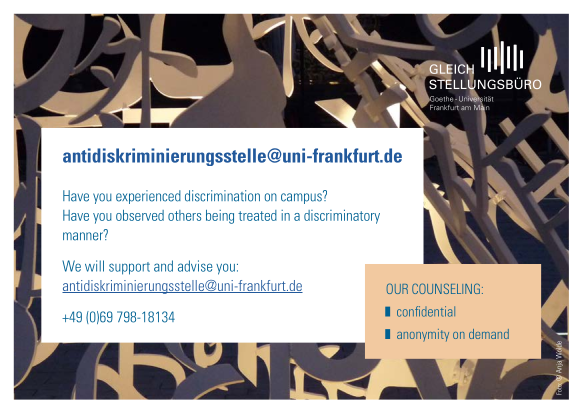- GU Home
- Equal Opportunities Office
- Laut*stark Campaign

(Vigorously confronting sexualized discrimination and violence.)
With its “laut*stark" campaign ('loud and strong'), Goethe University is taking a firm stand against all forms of sexualised discrimination and violence.
In so doing, the university is drawing attention to sexualised discrimination and violence, which is also being discussed more extensively at Goethe University in the context of the #MeToo debate, and making incidents of sexualised discrimination more visible.
As a consequence of this discussion, the Equal Opportunities Office and other university institutions have enhanced their work against sexualised discrimination and violence in order to provide more safety on campus, to stand up for those affected, and to expand counselling services.
Goethe University takes a firm stand against all forms of sexualised discrimination and violence.
We encourage and ask those affected by sexualised discrimination and violence, as well as witnesses and confidants, to report incidents and to make use of the support and counselling offered within and outside the university.
Speak Out (German): Dr Anja Wolde, Equal Opportunities Officer and Head of the Equal Opportunities Office, and Vice President Professor Rolf van Dick in an interview about the “laut*stark" campaign in UniReport 6.18 (German)
Forms of discrimination, courses of action and information
Sexualised discrimination is always an expression of violence and a crossing of boundaries that can be displayed in verbal, non-verbal, physical or virtual ways, e.g.:
- “Catcalling”, sexually suggestive remarks and “jokes” about appearance, clothing, behaviour, private life
- Derogatory comments with sexual content
- Indiscreet “questioning” about lifestyle
- Circulating, posting or displaying material with sexist or pornographic content
- Repeated and persistent staring and stalking
- Unwelcome verbal and physical advances, e.g. wolf whistling, “chatting up”, touching, harassment
- Requests for sexual acts
- Threats of violence, enforced sexual acts and coercion
- Cyberbullying, e.g. harassing messages via mobile phones, in chats or by email
Sexualized discrimination does not mean mutual sexual interest or flirting entered into consensually or touching a person accidentally.
Each incident is different, and everyone reacts differently, so there is no standard advice on how to behave. Below you can find some alternative courses of action that have proven effective and that you can take accordingly depending on the situation:
- Do not wait for the misconduct to end by itself.
- Do not be afraid to act decisively and end the conversation – you do not owe it to anyone to talk to them!
- Address the perpetrator directly, use clear words and gestures to label their misconduct and establish distinct boundaries.
- Protest vigorously.
- Do not let anything be taken out of your hands.
- In an acute situation, call for help and ask for assistance from people nearby; the security services and staff at reception can also help you.
- Stay alert and help people if you have the impression that they feel uncomfortable about a conversation or ostensible flirting.
- Report incidents to Goethe University’s counselling services.
Take your own feelings, impressions and perceptions seriously and be conscious of the fact that you are not an isolated case nor are you to blame for others’ misconduct.
Sexualised discrimination is always an expression of violence and a crossing of boundaries that can be displayed in verbal, non-verbal, physical or virtual ways, e.g.:
- “Catcalling”, sexually suggestive remarks and “jokes” about appearance, clothing, behaviour, private life
- Derogatory comments with sexual content
- Indiscreet “questioning” about lifestyle
- Circulating, posting or displaying material with sexist or pornographic content
- Repeated and persistent staring and stalking
- Unwelcome verbal and physical advances, e.g. wolf whistling, “chatting up”, touching, harassment
- Requests for sexual acts
- Threats of violence, enforced sexual acts and coercion
- Cyberbullying, e.g. harassing messages via mobile phones, in chats or by email
Sexualized discrimination does not mean mutual sexual interest or flirting entered into consensually or touching a person accidentally.
Each incident is different, and everyone reacts differently, so there is no standard advice on how to behave. Below you can find some alternative courses of action that have proven effective and that you can take accordingly depending on the situation:
- Do not wait for the misconduct to end by itself.
- Do not be afraid to act decisively and end the conversation – you do not owe it to anyone to talk to them!
- Address the perpetrator directly, use clear words and gestures to label their misconduct and establish distinct boundaries.
- Protest vigorously.
- Do not let anything be taken out of your hands.
- In an acute situation, call for help and ask for assistance from people nearby; the security services and staff at reception can also help you.
- Stay alert and help people if you have the impression that they feel uncomfortable about a conversation or ostensible flirting.
- Report incidents to Goethe University’s counselling services.
Take your own feelings, impressions and perceptions seriously and be conscious of the fact that you are not an isolated case nor are you to blame for others’ misconduct.
Counselling centres and support services

Counselling services
Unfortunately, sexualised discrimination is still an everyday occurrence for many. The university encourages those affected to contact the specialised counselling services both within and outside Goethe University in the event of sexual harassment.
Support and confidential counselling, anonymous if preferred, are available at Goethe University, from the City of Frankfurt or from independent counselling centres. Goethe University works together with counselling centres specialised in dealing with sexual harassment.
The following contact persons are on hand to advise persons affected by sexualised discrimination and violence and can refer them to other counselling and support services. They also help the university to implement preventive measures against sexualised violence. Counselling is confidential and can also be anonymous if preferred.

For University Stuff
Counselling for staff
Deputy Equal Opportunities Officer
Annemarie Eifler
Tel.: +49 69 798-18123
annemarie.eifler@em.uni-frankfurt.de
Campus Westend, SKW-Building, Room 05.C106
Counselling for students
Antidiscrimination Center
Jana Arnold
Tel.: +49 69798-18134
j.arnold@em.uni-frankfurt.de
Campus Westend, SKW-Building, Room 05.C114

External services
Attention: In case of acute threat, please contact the police: 110
Women's Emergency Hotline Frankfurt (German website)
Emergency medical assistance in case of rape (German website)
Wildwasser Frankfurt - Counseling center against sexual abuse (German website)
Contact
Equal Opportunities Officer
Head of the Equal Opportunities Office
Dr. Anja Wolde
Fon.: +49 69 798-18100
E-Mail: wolde@em.uni-frankfurt.de
Antidiscrimination Center
Contact:
antidiskriminierungsstelle@uni-frankfurt.de
Contact person:
Jana Arnold
Fon.: +49 69798-18134
E-Mail: j.arnold@em.uni-frankfurt.de
- Studying at Goethe University
- International applicants
- Faculties
- Overview of study programmes
- Programme for refugees
- GRADE
- Goethe Business School (continuing education)
- Research at Goethe University
- Scientific news
- Goethe Welcome Center (for international researchers)
- Collaborative research projects
- Individual research
- Visiting fellowships
- Endowed chairs
- About the University
- News-in-brief
- University administration
- Campus locations
- Campus life
- University archives (German)
- Rhine-Main-Universities








